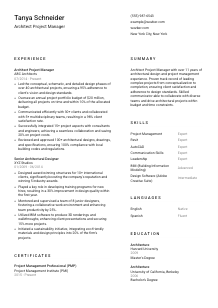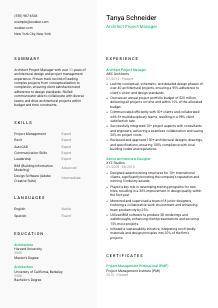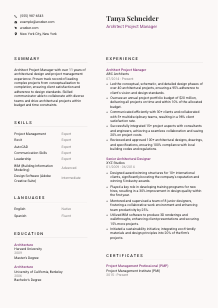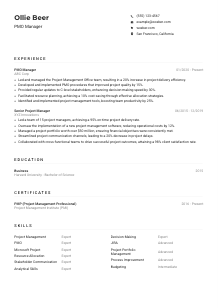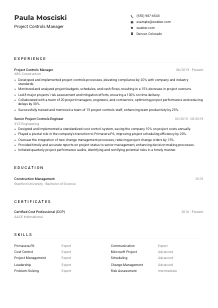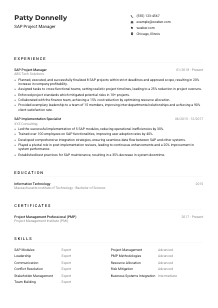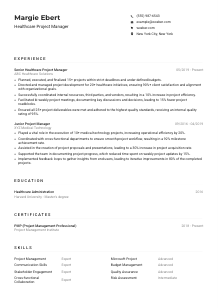Architect Project Manager Resume Example
Orchestrating designs, but feel your resume's blueprint is out of sync? Scroll through this Architect Project Manager resume example, constructed using Wozber free resume builder. Discover how you can render your project leadership and architectural acumen to align with job criteria, building a career as visionary and structurally sound as your constructions!
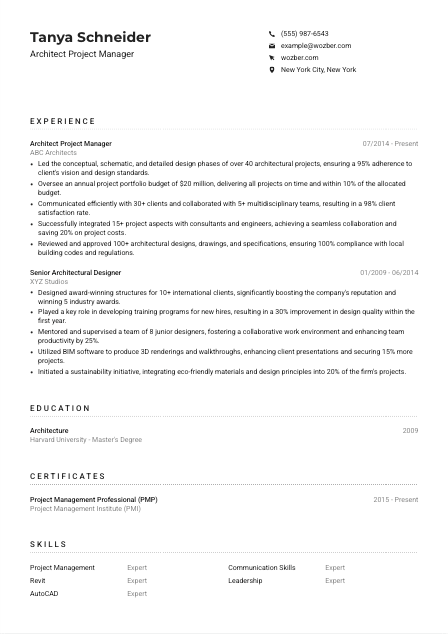
How to write an Architect Project Manager Resume?
As an Architect Project Manager poised for your next big project, your resume needs to be the blueprint of your career, reflecting the meticulous planning and vision you apply in your work. With the job market as competitive as a bidding war for a prime piece of land, your resume isn't just a document; it's your professional manifesto. Leveraging Wozber's free resume builder, this guide will steer you through the process of creating a resume that's not just ATS-compliant but a reflection of your architectural prowess and project management acumen.
Let's lay the foundation for a resume that showcases your skills and experiences as compelling as the structures you aspire to create.
Personal Details
The facade of your Architect Project Manager resume starts with the Personal Details section. While it appears straightforward, crafting it thoughtfully can act as your handshake in the digital world, inviting hiring managers to delve deeper into your professional journey.
1. Name as Your Branding
Your name is essentially your personal brand. Use a clean, professional font, ensuring it's the most prominent text on the page, just like how the entrance of a building sets the expectation for its interior.
2. Job Title Alignment
Matching your job title with the one you're applying for, in this case, 'Architect Project Manager,' placed prominently below your name, acts like a design statement, immediately aligning your profile with the job requirements.
3. Essential Contact Information
Just as you'd ensure all pathways in a building are clear and accessible, ensure your contact information is easy to find and accurate. A professional email format (firstname.lastname@email.com), and current city and state hint at reliability. Remember, your phone number is the bridge for communication – double-check it for accuracy.
4. Location Synergy
"Must be located in New York City, New York." This requirement becomes an asset when your resume confirms your New York City location right off the bat. It signals immediate availability and saves potential relocation discussions.
5. Online Portfolio
If you have a professional LinkedIn profile or a digital portfolio showcasing your projects, include it. This acts like an open door, inviting hiring managers to view your work even before the interview.
Takeaway
Your personal details set the stage; they need to be clear, professional, and reflective of the job's geographical and professional requirements. Consider this section as your chance to make a strong first impression, ensuring every detail aligns with the Architect Project Manager role.





Experience
The Experience section is the core structure of your resume, where you detail your professional achievements and roles. Tailoring this section to reflect the job description for an Architect Project Manager is key to demonstrating your suitability.
- Led the conceptual, schematic, and detailed design phases of over 40 architectural projects, ensuring a 95% adherence to client's vision and design standards.
- Oversee an annual project portfolio budget of $20 million, delivering all projects on time and within 10% of the allocated budget.
- Communicated efficiently with 30+ clients and collaborated with 5+ multidisciplinary teams, resulting in a 98% client satisfaction rate.
- Successfully integrated 15+ project aspects with consultants and engineers, achieving a seamless collaboration and saving 20% on project costs.
- Reviewed and approved 100+ architectural designs, drawings, and specifications, ensuring 100% compliance with local building codes and regulations.
- Designed award‑winning structures for 10+ international clients, significantly boosting the company's reputation and winning 5 industry awards.
- Played a key role in developing training programs for new hires, resulting in a 30% improvement in design quality within the first year.
- Mentored and supervised a team of 8 junior designers, fostering a collaborative work environment and enhancing team productivity by 25%.
- Utilized BIM software to produce 3D renderings and walkthroughs, enhancing client presentations and securing 15% more projects.
- Initiated a sustainability initiative, integrating eco‑friendly materials and design principles into 20% of the firm's projects.
1. Aligning with Job Requirements
First, match your professional experience with the job requirements. Spotlight roles where you've "led the conceptual, schematic, and detailed design phases" or "overseen project budgets" to mirror the key responsibilities highlighted in the job description.
2. Highlighting Projects and Roles
Mention the company name, your title, and the dates of your employment, just as you would outline the specifications of a project. Here, the narrative of your career unfolds, showcasing your evolution in the architectural and project management sphere.
3. Quantifiable Successes
Numbers tell a story. Whether it's "overseeing an annual project portfolio budget of $20 million" or leading projects that resulted in a "98% client satisfaction rate," quantify your achievements. This adds scale and perspective to your capabilities, much like dimensions bring a blueprint to life.
4. Relevance is Key
Focus on the experience directly related to the Architect Project Manager role. Extraneous information can clutter your resume, much like unnecessary elements can detract from a building's design purpose.
5. Leadership and Collaboration
Emphasize your ability to "lead and collaborate with multidisciplinary teams," showcasing interpersonal skills that are crucial for project success. Your role as an orchestrator of diverse expertise is a valuable asset.
Takeaway
Your experience section is your portfolio within a resume, each bullet point a testament to your architectural and management prowess. Make it compelling, clear, and a direct reflection of what you bring to the Architect Project Manager position. Think like a designer; each word you choose is a stroke of your pen on the blueprint of your career.
Education
The Education section of your resume provides the foundation of your architectural knowledge and skills. Even the most experienced professionals need this cornerstoneto demonstrate the solid base of their expertise.
1. Degree Requirements
Echoing the job requirement for a "Bachelor's or Master's degree in Architecture," list your highest level of education in architecture. It's essential to match these credentials to showcase your compliance with the foundational requirements.
2. Clear Structure
Maintain clarity in this section as you would in drafting a building plan. List your degree, the institution, and your graduation year. Precision and simplicity in presentation are key.
3. Degree Specificity
If your degree directly aligns with the role—like a Master's Degree in Architecture for this Architect Project Manager position—make it prominent. This affirms you have the targeted educational background.
4. Course Relevance
Though this resume example doesn't highlight specific courses, mentioning specialized courses can be advantageous, especially if they connect directly to skills or knowledge emphasized in the job description.
5. Educational Achievements
Highlight any honors or distinctions that showcase your dedication and excellence in architecture. This can be particularly impressive if you're early in your career or if such achievements directly support your qualifications for the role.
Takeaway
Your education section is the firm foundation upon which your career is built. Ensure it's robust and reflective of the qualifications required for an Architect Project Manager role. Like any strong foundation, it should clearly bear the weight of the professional structure you've built atop it.
Certificates
In the world of Architecture and Project Management, certifications act as proof of your commitment to continuous learning and expertise in specific areas. Highlighting these can significantly bolster your application.
1. Identifying Pertinent Certifications
Focus on certifications directly relevant to the job or the industry, such as the "Project Management Professional (PMP)" or "Construction Documents Technologist (CDT)" as stated in the job description. These show a specialized commitment to your field.
2. Quality Over Quantity
Rather than listing every certificate you've ever earned, select those that strongly align with the position's needs. This strategic choice highlights your specialized knowledge and ambition in architecture and project management.
3. Up-to-Date Validity
Ensure your certifications are current, providing dates if applicable. This reassures the employer of your ongoing proficiency and dedication to keeping your skills sharp, much like ongoing maintenance ensures a building's integrity.
4. Continuous Learning
Architecture and project management are ever-evolving fields. Show your commitment to professional growth by pursuing relevant, up-to-date certifications, staying ahead of industry trends and standards.
Takeaway
Your certifications are like the decorative elements that add character to a building, illustrating your unique professional narrative. Choose and present them wisely to enhance your candidacy for the Architect Project Manager role.
Skills
The Skills section is where you get to show off the tools in your professional toolbox. For an Architect Project Manager role, balancing technical skills with leadership and communication abilities is crucial.
1. Matching Job Description Skills
Extract skills directly from the job posting such as "Proficiency in BIM software" and match them with your expertise. This direct correlation shows you're not just qualified but prepared to hit the ground running.
2. Hard and Soft Skills
Balance your technical skills, like your expertise in "Revit" and "AutoCAD," with soft skills such as "strong interpersonal and communication skills." This combination reflects the multifaceted nature of the Architect Project Manager role.
3. Skill Organization
Keep your list organized and focused. A cluttered skills section is like an over-ornamented facade; it can obscure the true structure beneath. Focus on the skills that will most intrigue a hiring manager for this specific role.
Takeaway
Think of the Skills section as your architectural model, a miniature but detailed representation of your professional capabilities. Ensure it reflects the balance and depth of your expertise, presenting a compelling case for your candidacy as an Architect Project Manager.
Languages
In the global field of architecture, the ability to communicate across languages can distinguish you as a versatile and adaptive candidate. This section, while seemingly minor, can add a dynamic layer to your resume.
1. Job Language Requirement
The job posting specifies strong English language competence. Highlight your "Native" proficiency in English at the top, affirming your ability to communicate effectively in the primary language of the role.
2. Listing Additional Languages
If you're fluent in other languages like "Spanish", list them next. This can display your potential to communicate with a broader range of clients and stakeholders, adding flexibility to your professional skill set.
3. Honest Proficiency Levels
Candidly assess your language proficiency levels. Overstating your ability can lead to miscommunications, just like overpromising in a project can lead to pitfalls. Transparency is key.
4. Languages as a Cultural Bridge
For roles involving diverse teams or international projects, emphasizing your language skills can be particularly appealing, showing you're equipped to navigate and bridge cultural and communicative gaps.
5. Expanding Your Architectural Vernacular
Consider the role's scope and how your linguistic abilities can serve as an asset. Even basic proficiency in a second language can be a valuable tool in your professional toolkit, enhancing your appeal to employers.
Takeaway
Your ability to communicate in multiple languages is like an architect's ability to work with diverse materials, offering both flexibility and strength. Present your languages as complementary assets, enhancing your profile for the Architect Project Manager role.
Summary
The Summary is your elevator pitch, an opportunity to distill your architectural vision and project management skills into a concise, compelling narrative that captures the hiring manager's attention right from the start.
1. Grasping the Job Essence
Begin by internalizing the job's core requirements. Express how your over "11 years of architectural design and project management experience" directly aligns with what they're seeking in a candidate.
2. Lead with Your Professional Identity
Introduce yourself with a focus on your strengths and career highlights. A statement like 'Architect Project Manager with a proven track record' sets a confident tone of professional competence.
3. Address Key Competencies
Pinpoint your unique competencies and achievements that meet the job's demands. Mentioning your "expertise in leading complex projects from conceptualization to completion" directly mirrors the responsibilities of the role.
4. Brevity is the Soul of Wit
Keep your summary clear and to-the-point, packing a punch in 3-5 lines. This isn't the place for a detailed career history but rather a teaser that leaves them wanting to dive deeper into your resume.
Takeaway
Your summary is the key to capture the hiring manager's interest, making them eager to explore how your architectural excellence and project management skills can contribute to their projects. It's your chance to shine brightly in a crowded market, pitching yourself as the ideal candidate for the Architect Project Manager role.
Embarking on Your Architect Project Manager Journey
Congratulations, you're equipped with a blueprint for crafting an Architect Project Manager resume that resonates with hiring managers. Your resume is a pivotal tool in your job search, a reflection of your architectural design and project management capabilities. Armed with the insights from this guide and the tools provided by Wozber's free resume builder, including ATS-friendly resume templates and ATS resume scanner for optimization, you're ready to build a career as impactful as your projects. Remember, the role you're aspiring to is like a complex structure awaiting your touch.
Use your resume to showcase the unique skills and visions you bring as an Architect Project Manager. The world of architecture and project management awaits your expertise. Take this step with confidence and let your career soar to new heights!

- Bachelor's or Master's degree in Architecture from an accredited institution.
- Minimum of 8 years of architectural design experience, with at least 3 years in a project management capacity.
- Proficiency in BIM software such as Revit and AutoCAD.
- Strong interpersonal and communication skills, with an ability to lead and collaborate with multidisciplinary teams.
- Relevant certifications such as a Project Management Professional (PMP) or Construction Documents Technologist (CDT) are preferred.
- Must demonstrate strong English language competence.
- Must be located in New York City, New York.
- Lead the conceptual, schematic, and detailed design phases of architectural projects, ensuring adherence to client's vision and design standards.
- Oversee project budgets, schedules, and resources, ensuring projects are delivered on time and within budget.
- Communicate and collaborate with clients, stakeholders, and contractors to ensure project success and client satisfaction.
- Coordinate with consultants, engineers, and various internal and external teams to integrate all aspects of a project.
- Review and approve architectural designs, drawings, and specifications to ensure compliance with local building codes and regulations.





